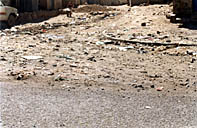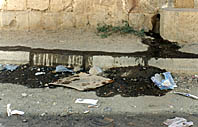
Second Follow-Up to a Yemen Times Article: CONDITION OF OUR ROADS [Archives:1998/45/Business & Economy]
November 9 1998
The Republic of Yemen has today some 5,000 kilometers of asphalted roads, and nearly 20,000 kms of feeder roads. The conditions of our roads are not good. They often fall into disrepair long before the end of their life-span.
Yemen Times published a story on the condition of our roads in its issue of October 26th. Last week (issue of 2nd November) it ran the views of the Highway Authority.

This week, we are running the views of the Ministry of Housing, Construction and Urban Planning. Mohammed Hatem Al-Qadhi, Yemen Times Assistant Managing Editor, talked to Engineer Faisal Hizam Al-Hammady, General Road Director at the Ministry. Excerpts:
Q: What is the mandate of the Road Directorate?
A: The Road Directorate’s main job is to control and supervise road projects all over Yemen. In the past, the Highway Authority was responsible for doing this job. They used to design, construct and monitor road projects. It was even self-financing and self-monitoring.
By the beginning of this year, all those tasks were transferred to the Ministry. Now the Ministry supervises the work, and even has responsibility for designing our roads. We are now in charge of constructing highways and roads inside cities.
Q: Construction on some highways was interrupted for a long time. Why?
A: That is true, but since we have taken over, construction on many projects has been resumed. Some examples include Dhale-Shuaib, Saada-Saqain and other roads. The Hajjah-Khushm, were handed over to the Highway Authority for execution.
But the Ministry did stop some construction. When we took responsibility for the job, it stopped the contractors because work was not done according to specifications. The contractors are working again and correcting the shortcomings.
Q: What is the annual budget allocated for road construction?
A: The budget allocated for roads this year by the government is about $6.4 million. There are, of course, some projects which are financed through foreign donors like IDA, the Islamic Bank and the Arab Fund. This year’s total external financing is about $4 million.

A: Not all our asphalt roads fall into disrepair before they finish their life-span. But when that happens, and it often does, there are reasons, though not wholly due to bad construction.
These are some other factors:
1- Drivers of trucks and other heavy vehicles don’t abide by the weight of the cargo specified for them.
2- The piling up of earth and rubbish on the sides of the roads block rain water gutters and proper drainage.
3- Citizens construct bumps thus blocking drainage of rain water, and often damaging the asphalt.
4- Side streets and pavements are not asphalted leading to an influx of stones and earth on to the asphalted streets, badly affecting them.
5- Shop and house owners break the asphalted streets as they dig sewerage channels in the streets and don’t re-pave dug areas. This makes the damaged areas expand further and further.
6- Construction material is often left on the side of streets after the completion of work. Sometimes, the construction work itself is done on the asphalt.
7- The flow of sewage on the asphalt surface damages it before the end of its life-span.
In general, the surface of the asphalt should be kept clean and free of any materials which shorten the road’s life-span. This is the responsibility of the local authorities and communities. When we finish our work, we hand over responsibility for road maintenance to them and it is they who should take care of, and maintain the roads.

A: It is not the rain only. There are other factors at play. There was lack of maintenance. In the past, maintenance was the responsibility of the Highway Authority. But since it had no money, that job was not done.
The rains damaged some roads because water conduits were totally clogged and not clean for the flood water to pass through. But from now on, we issued instructions to the Highway Authority to carry out regular maintenance work. We are supervising their work.
Q: Do you have any plans to expand the narrow and congested roads connecting Sanaa, Taiz and Hodeidah?
A: Yes, these roads are narrow and congested. If it had been our responsibility, we would have long done something about it. Now the Ministry is considering improving these roads.
We are considering constructing tunnels in Sumarah and Manakhah in collaboration with private investors. This means that drivers will have to pay fees or tolls if they want to use these tunnels. The construction of the road and the safety factor will evidently be superior.
——
[archive-e:45-v:1998-y:1998-d:1998-11-09-p:./1998/iss45/b&e.htm]


